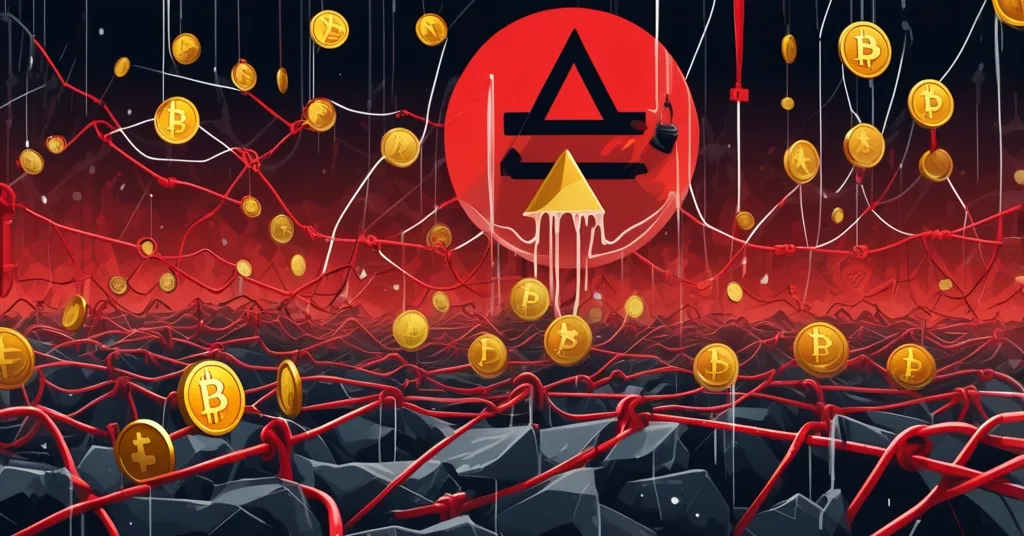BNB Chain X Hack Alert: CZ Warns of Phishing Scam Amid Global Crypto Milestones

BNB Chain X Account Hack Warning: CZ Sounds Alarm as Crypto World Faces Fraud and Adoption Milestones
BNB Chain’s official X account has likely been compromised, posting dangerous phishing links that could drain your wallet faster than you can say “private key.” Binance co-founder Changpeng “CZ” Zhao has issued an urgent warning to steer clear, while elsewhere, Kazakhstan bets big on crypto with a national reserve and the UK exposes a staggering $6.7 billion Bitcoin fraud. Buckle up—it’s a wild ride in the crypto sphere.
- BNB Chain Breach: Official X account appears hacked, promoting a fake $BSC rewards scam with phishing links.
- CZ’s Alert: Binance’s co-founder warns users against clicking suspicious links as a probe is launched.
- Global Updates: Kazakhstan launches a BNB-backed crypto reserve; UK seizes 61,000 BTC in a massive fraud bust.
BNB Chain Hack: A Phishing Nightmare Unfolds
The crypto community woke up to a nasty surprise this week when the official X account of BNB Chain started peddling a dubious $BSC rewards program, promising payouts within 24 hours. If your scam radar isn’t blaring, it should be. This post, laced with a phishing link, is a textbook play to swipe digital assets and personal data from unsuspecting users. For those new to the game, phishing links are malicious URLs that often lead to fake websites mimicking legit platforms—think a faux Binance login page designed to steal your credentials or wallet keys the second you type them in. It’s like handing a thief your ATM PIN on a silver platter. Reports suggest this potential hack of BNB Chain’s X account has raised alarms across the community, with CZ stepping in to mitigate damage.
Binance co-founder Changpeng “CZ” Zhao didn’t waste time, taking to social media on Wednesday with a blunt heads-up:
“Please do not click on any links recently posted from this account.”
CZ confirmed that an investigation is ongoing to assess the breach. Details are thin right now, but BNB Chain—a blockchain tied to Binance, powering decentralized apps and tokens like BNB—is a high-value target for hackers. A compromised official channel like this isn’t just a PR headache; it’s a direct threat to user trust and funds. We’ve seen similar hacks hit other major projects in the past, from fake airdrops on Twitter to hijacked Discord servers, often costing users millions. Could this dent BNB’s price or shake confidence in the ecosystem? It’s too early to call, but history suggests the fallout can linger longer than the hack itself.
Let’s cut the crap: clicking a shady link can nuke your savings in seconds. The crypto space thrives on decentralization and disrupting outdated systems, but freedom comes with responsibility. If you’re not using two-factor authentication (2FA)—an extra security step like a code sent to your phone—or stashing your assets in a hardware wallet (a physical device that keeps your keys offline), you’re playing with fire. Scams like this aren’t new, yet they keep working because people fall for the bait. Until Binance gives the green light, treat anything from BNB Chain’s X account as radioactive. We’re following up for more intel and will keep you posted.
Kazakhstan’s Crypto Leap: BNB as National Reserve Asset
On a more upbeat note, Kazakhstan is making bold strides into the crypto frontier, launching its first national crypto reserve through the Alem Crypto Fund, managed by Qazaqstan Venture Group in partnership with Binance Kazakhstan. The kicker? BNB, the native token of BNB Chain, is the inaugural asset in this state-backed pool. Think of it as a modern twist on gold reserves—a government hoarding digital assets to diversify its economic arsenal and signal tech-forward ambitions. Under President Tokayev’s push for innovation, Kazakhstan isn’t stopping there. They’ve crafted rules for stablecoin payments (cryptos pegged to stable assets like the US dollar to avoid wild price swings), debuted Central Asia’s first spot Bitcoin ETF (a fund tracking Bitcoin’s price for mainstream investors), and plan to roll out a central bank digital currency, the digital tenge, by late 2025.
This is big. A sovereign nation betting on BNB lends serious legitimacy to the token and could nudge other countries to explore crypto reserves. It also ties into the broader trend of governments warming up to blockchain tech, seeing it as both a financial tool and a geopolitical flex. But let’s not pop the champagne yet. Tying national reserves to a volatile asset like BNB carries risks—price crashes could hit state coffers hard, and regulatory missteps might spook investors. Plus, partnering with Binance, a centralized giant, raises eyebrows among decentralization purists like us. Is this true adoption of crypto’s ethos, or just a flashy PR move? Kazakhstan’s got the vision, but execution will be the real test. If they pull it off, they could be a blueprint for others; if they stumble, it’s a cautionary tale.
UK Bitcoin Fraud: A $6.7 Billion Gut Punch
Now for the ugly side of crypto—a colossal fraud case in the UK that’ll make your stomach turn. Zhimin Qian, aka Yadi Zhang, a Chinese national, recently pleaded guilty in a London court to scamming over 128,000 victims out of 61,000 Bitcoin, worth a mind-blowing $6.7 billion at today’s prices. Operating between 2014 and 2017, Qian lured investors in China with promises of fat returns, only to launder the stolen loot through digital assets and luxury real estate. An accomplice, Jian Wen, got nabbed earlier and was sentenced in 2023 for helping wash the funds. UK police seized over £300 million in Bitcoin from Wen, one of the largest crypto hauls ever recorded.
This isn’t just a bad day for the victims; it’s a glaring neon sign of crypto’s persistent dark underbelly. The pseudonymity and borderless nature of blockchain make it a magnet for money laundering—Qian exploited that to the tune of billions. Sure, Bitcoin isn’t the bad guy here; it’s a neutral tool, like cash or a getaway car. But cases like this ammo up critics who paint crypto as a criminal playground. On the flip side, the UK’s bust shows law enforcement is catching on, using blockchain’s public ledger to trace dirty funds. Every Bitcoin transaction is etched on an open record, and with the right tools, cops can follow the money trail from wallet to wallet. It’s a double-edged sword: decentralization empowers users, but transparency can bite scammers in the ass. Still, with 128,000 people burned, this saga screams for better investor protections and global crackdowns. If it smells like a get-rich-quick scheme, folks, it probably is.
Navigating Crypto’s Messy Reality
These stories—BNB Chain’s hack, Kazakhstan’s adoption, and the UK’s fraud bust—lay bare the chaotic beauty of the crypto world. We’re all in for decentralization, privacy, and sticking it to the financial old guard, but damn, the road is bumpy. Social media breaches remind us that even big players can slip up, exposing users to ruthless scams. State-level moves like Kazakhstan’s show the potential for blockchain to reshape economies, though not without pitfalls. And billion-dollar frauds prove that for every step forward, there’s a shadow ready to drag us back. Building the future of money isn’t a tidy affair; it demands sharp eyes, tighter security, and a refusal to swallow hype wholesale. Trust is earned, not assumed, in this game.
Key Questions and Takeaways
- What are the dangers of the BNB Chain X account hack for users?
Clicking phishing links risks losing crypto assets and personal data instantly, leading to financial ruin and security breaches that are often impossible to reverse. - Why does Kazakhstan’s BNB reserve matter for crypto adoption?
It signals growing state acceptance of digital assets, boosts BNB’s credibility, and may inspire other nations to experiment with blockchain in national finance strategies. - What lessons emerge from the UK’s $6.7 billion Bitcoin fraud case?
It exposes crypto’s vulnerability to massive scams and laundering, underscoring the urgent need for tougher regulations and cross-border efforts to safeguard investors. - How can the crypto crowd shield itself from social media hacks?
Use 2FA for extra account security, store funds in offline hardware wallets, double-check URLs before clicking, and stay alert to warnings from trusted voices like CZ.



